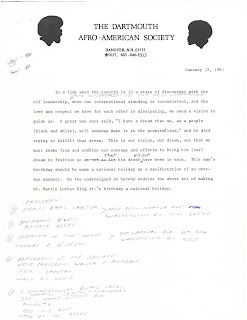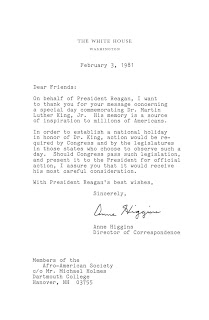 Founded in April of 1966,
in the midst of the American civil rights movement, the Afro-American Society
(AAS) was a deliberate attempt to increase awareness of and create community
for African-American students at Dartmouth as well as to make the Dartmouth
experience relevant to the outside world. Before this time, black students on
campus had tended to "go their separate ways," according to a member of the
class of 1958. However, in the 1960s, the American civil rights
movement came to campus through speeches given on campus by Dr Martin Luther King,
Jr., and other national black leaders such as Malcolm X and Stokely Carmichael.
These intersections with issues of national importance had a profound impact
upon the African-American students at Dartmouth, who began to see themselves as a community on campus instead of isolated individuals. Their subsequent
increased commitment to social justice and desire to strengthen their communal
identity gave birth to the Afro-American Society, which has continued a strong
tradition of fighting against social inequality both on campus and in the larger global community.
Founded in April of 1966,
in the midst of the American civil rights movement, the Afro-American Society
(AAS) was a deliberate attempt to increase awareness of and create community
for African-American students at Dartmouth as well as to make the Dartmouth
experience relevant to the outside world. Before this time, black students on
campus had tended to "go their separate ways," according to a member of the
class of 1958. However, in the 1960s, the American civil rights
movement came to campus through speeches given on campus by Dr Martin Luther King,
Jr., and other national black leaders such as Malcolm X and Stokely Carmichael.
These intersections with issues of national importance had a profound impact
upon the African-American students at Dartmouth, who began to see themselves as a community on campus instead of isolated individuals. Their subsequent
increased commitment to social justice and desire to strengthen their communal
identity gave birth to the Afro-American Society, which has continued a strong
tradition of fighting against social inequality both on campus and in the larger global community. In the
decades following its inception, the Afro-American Society has continued to be a
force for change at the national level. In 1981, the organization sent a letter to
several prominent national political figures in Washington, D.C., including President
Ronald Reagan and Speaker of the House Tip O'Neill to recommend that Martin Luther King Jr.'s birthday become a national holiday. Two years previously, a bipartisan effort to that effect had been narrowly defeated in the U.S. House of Representatives. The White House's response was carefully crafted, avoiding any mention of the fact that Reagan himself was not a fan of the proposal. However, true to his word, the President eventually signed the holiday into existence on
November 2, 1983, when the bill finally came to his desk. Still, it would take nearly
seventeen years before the entire country formally recognized the holiday, with
Utah being the last state to hold out.
In the
decades following its inception, the Afro-American Society has continued to be a
force for change at the national level. In 1981, the organization sent a letter to
several prominent national political figures in Washington, D.C., including President
Ronald Reagan and Speaker of the House Tip O'Neill to recommend that Martin Luther King Jr.'s birthday become a national holiday. Two years previously, a bipartisan effort to that effect had been narrowly defeated in the U.S. House of Representatives. The White House's response was carefully crafted, avoiding any mention of the fact that Reagan himself was not a fan of the proposal. However, true to his word, the President eventually signed the holiday into existence on
November 2, 1983, when the bill finally came to his desk. Still, it would take nearly
seventeen years before the entire country formally recognized the holiday, with
Utah being the last state to hold out.
This year marks fifty years since the Afro-American Society first came into being. In celebration of that fact, and in collaboration with the Office of Institutional Diversity and Equity's week-long celebration of the life of Dr. Martin Luther King, Jr., Rauner Library is displaying an exhibit in the Reading Room related to the efforts of the Afro-American Society to promote social justice down through the years. The exhibit will be up from January 8 through February 26. Come by any time we're open to check it out! Once the exhibit comes down, you can still see the exchange of correspondence by asking to see Box 3607 from the African-American Society records (DO-47). The letters are in a folder marked "Correspondence with National Government."
No comments :
Post a Comment